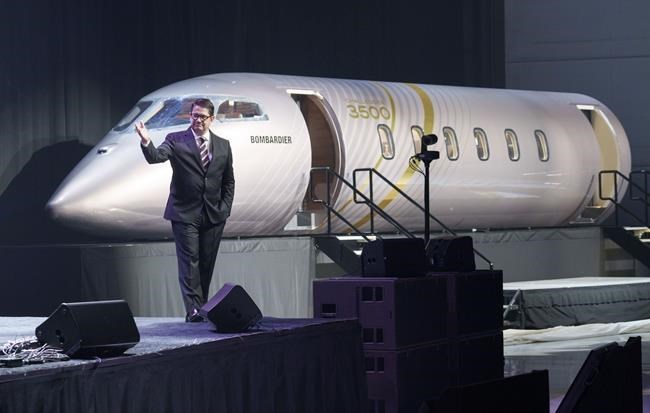MONTREAL — The head of Bombardier Inc. said it will steer clear of business with sanctioned Russian individuals, companies and institutions, as Moscow launched an invasion of Ukraine Thursday.
“It’s a very, very sad situation right now," CEO Éric Martel told reporters during a video conference from a Bombardier hangar in Montreal, saying the company will continue to monitor the situation and "follow all guidelines."
"We will not pursue business with sanctioned individuals or entities."
Martel said about five or six per cent of the luxury jet maker's US$6.1 billion in annual revenue comes from clients in Russia or the CIS — roughly the same as Canada's share.
"We may have to terminate some of these agreements if ever there are sanctions on some of our customers," he said..
On Tuesday, Prime Minister Justin Trudeau announced what he described as a first round of sanctions against Russia, which include banning any financial dealings with the regions of Luhansk and Donetsk in Ukraine's eastern industrial lands, and with Russian politicians who supported a motion calling for them to be recognized as independent.
Less than an hour after Martel spoke with reporters Thursday, Trudeau imposed more severe sanctions that target 58 people and entities connected to Russia. These include key cabinet ministers close to President Vladimir Putin, members of the country's elite and their families, the paramilitary organization known as the Wagner Group and major Russian banks.
"As contracts with our clients include confidentiality clauses, we can’t comment on any of our ongoing transactions," Bombardier spokeswoman Tinca Stokojnik Prouvost said in an email responding to whether the fresh sanctions target company customers.
The sanctions, unveiled as missiles hit Ukrainian cities and military facilities across the country and tanks and troops rolled in from three directions, have no direct impact on Bombardier's supply chain. The Quebec-based company has no operations in Russia or the eight other nearby members of the Commonwealth of Independent States (CIS), Martel said.
Meanwhile, Bombardier plans to triple capital spending as demand grows and its biggest rival seeks to boost deliveries.
Ahead of an investor day Thursday, Martel announced the company will establish a “recurring, incremental capital allocation envelope of up to US$600 million per year" to put toward strategic projects or debt reduction.
The pledge follows an earlier guidance of US$200 million per year in capital expenditures.
It also comes as Bombardier continues to pay down US$5 billion in adjusted net debtwhile trying to keep up with rival Gulfstream Aerospace Corp., which aims to boost deliveries by 38 per cent to 170 private planes between 2022 and 2024.
"We have not made any statements that we have a program to spend those dollars on, or that they'll go to something else other than debt repayment," said chief financial officer Bart Demosky. But the more than half-billion-dollar figure does offer "flexibility" to flow toward "strategic investments" in the fleet or elsewhere, he added.
The Montreal-based company edged out its American competitor with 120 business aircraft deliveries last year versus 119 for Gulfstream, although the latter garnered US$680 million more in revenue, according to the General Aviation Manufacturers Association.
Gulfstream and Paris-based Dassault Aviation both announced plans last year to bring new private planes to market.
Martel reiterated Bombardier's guidance of US$7.5 billion in annual revenue by 2025 and 135 business jet deliveries next year.
"The competitor in our space would like to take our market share, and we are not about to let that happen," he said.
Bombardier has streamlined operations in recent years to become a pure-play manufacturer of luxury aircraft following the sale of its rail and commercial aircraft divisions.
Martel said the growing number of billionaires over the past decade means "more potential candidates" for purchases of Bombardier Challenger and Global series planes, which have list prices ranging from US$16 million to US$73 million.
Some 62 per cent of its deliveries went to ultra-wealthy individuals and private corporations last year, while 22 per cent went to large fleet operators, the company said.
Roughly half of deliveries were for U.S. customers and another 28 per cent for European ones.
Back home, Martel warned about the effects of a luxury tax on pricey planes, yachts and cars pledged last year by the Trudeau government, saying the promise has held up purchases.
"I have easily five, six transactions that have been on hold for many months now in Canada," he said.
This report by The Canadian Press was first published Feb. 24, 2022.
Companies in this story: (TSX:BBD.B)
— With files from Mike Blanchfield and Lee Berthiaume in Ottawa
Christopher Reynolds, The Canadian Press




